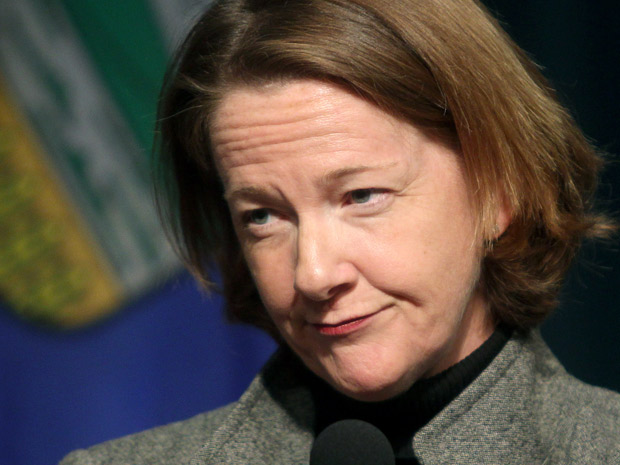Over the past year and a half, each of the Prairie provinces held crucial elections resulting in decisive majority governments. These governments will shape the political and cultural direction of the Prairies for the next four years – and, potentially, for a decade or more. As such, this series will examine the leaders we have chosen for this monumental task, who they are and where they plan to take us.
I begin with an examination of Alberta’s Progressive Conservative premier, Alison Redford; a national figure who is equal parts unifying and divisive.
As Albertans prepared to vote in a provincial election earlier this year, an unabated Progressive Conservative dynasty that had existed virtually unchallenged for 40 years was preparing to implode.
Danielle Smith, the young and charismatic leader of the nascent, right-wing Wildrose Alliance Party, was poised to beat Progressive Conservative premier Alison Redford. In fact, many polls predicted a Wildrose landslide just days before the April 23rd vote.
Canadian political commentators opined such a landslide would signify a cataclysmic rift in the Alberta conservative movement after the retirement of former PC premier Ralph Klein and the emergence of a stagnant post-recession economy.
Klein, of course, was the larger-than-life champion of balanced budgets and conservative social policies, who managed to retain power for 14 years.
His successor, Ed Stamach, distanced himself from this legacy by spending beyond the province’s means in order to curb the recession. And Alison Redford – a truly progressive conservative – seemed prepared to move even further to the centre.
In the face of this threat to the “Klein consensus,” the ideologically pure Danielle Smith – self-styled as a sharp-tongued heroine clad in blue jeans – seemed on the verge of returning the province to its glory days; when the Alberta “fire wall” still had the power to move minds and the government took its budget surpluses more seriously than its social programs.
However, contrary to almost all polling data in the latter days of April, Smith did not win government and instead the Wildrose Alliance secured Official Opposition status with just 17 seats.
The PCs won another commanding majority – just as they had for 40 years – with 61 seats in the provincial legislature.
The surprise victory was almost solely attributed to Premier Alison Redford, one of the most talented provincial politicians in Canada and a consensus-builder in the fashion of the late Peter Lougheed, the former Alberta premier who began the Tory dynasty by defeating the Social Credit Party in 1971.
But Redford is not Peter Lougheed and the political commentators who predicted a cataclysmic rift were correct. Redford now governs, despite an historic election victory, in a politically divisive province with a fractured conservative movement. This splintered culture makes the future of the PC dynasty increasingly questionable.
It is this unique confluence of circumstances that Redford will have to parse and reconcile as she attempts to lead Alberta to a place of prominence on the national stage after years of insularity.
In this task, she has so far proven both abundantly capable and, at times, stubbornly inept.
Redford is a professional policy wonk who believes wholeheartedly in the unifying power of political leadership. Trained as a lawyer, she spent most of her career on the national stage – as a policy adviser to Prime Minister Joe Clark and then in the prime minister’s office under Brian Mulroney.
Throughout the 1990s, she spent considerable time in the international arena – largely in Africa – as a technical adviser on constitutional and legal reform, working for organizations like the European Union and the Commonwealth Secretariat.
In her bid for the PC leadership in 2011 (after serving as an MLA and a cabinet minister since 2008), she beat out the stultifying old conservative boys club and brought a fresh vision to the party.
And as premier, she has built bridges between Alberta and the rest of Canada where there were once chasms. In Quebec, she has opened a dialogue as a fluently bilingual, moderate Western premier. In Ontario, she has managed – in short order – to construct a remarkably congenial relationship with Liberal premier Dalton McGuinty. And, finally, in conjunction with provincial governments across Canada, she is leading discussions around a National Energy Strategy.
But where she is a unifying, stateswoman-like figure in Eastern Canada, she has alienated many of her Western counterparts, both within and outside her province.
Regardless of whether Redford is solely to blame for her perpetual spat with British Columbia premier Christy Clark around royalties from the proposed Northern Gateway pipeline – which is slated to link the Alberta oil sands with a port at Kitimat, B.C. – the intergovernmental harangue has happened solely under her watch.
Similarly, no matter how many times she may dismiss characterizations of tension between the Alberta Progressive Conservatives and federal Tories, there is little doubt that such tension exists.
University of Calgary professor and former Harper strategist Tom Flanagan was the chief campaign officer for Wildrose. To add insult to injury, several federal Conservatives openly supported Danielle Smith, largely out of concern for the province’s fiscal condition.
Redford has stubbornly refused to expressly reach out to these detractors, despite coming from the same ideological family. She has insisted on running budget deficits in order to invest in education and infrastructure, and according to a recent column by Jeffrey Simpson of the Globe and Mail, she has developed a dictatorial reputation among her internal staff and caucus.
As Simpson wrote earlier this month: “the nastiest politics in Alberta are inside the conservative tent.”
Alison Redford has the potential to be a truly national leader, and doubtless many Albertans saw that when they shifted en masse to the PCs in April. Whether she will live up to that potential – and take the province to new heights as a dynamic, innovative economy – remains to be seen.
___
Ethan Cabel writes for the Spectator Tribune.
Follow us on Twitter: @SpectatorTrib
